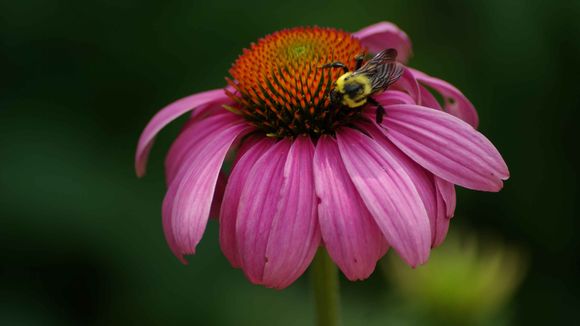Natural remedies
Pau d'Arco (Tabebuia impetiginosa)
Pau d'Arco, derived from the inner bark of the Tabebuia impetiginosa tree native to South America, is known for its antifungal and immune-boosting properties. It has been traditionally used in South American medicine for treating various infections (1).
Recipe
To prepare a Pau d'Arco tea, steep 1 tablespoon of the bark in 8 ounces of boiling water for 15-20 minutes. Drink the tea 2-3 times a day for optimal results.
Garlic (Allium sativum)
Garlic has long been revered for its antimicrobial properties, including its effectiveness against Candida infections (2). The active compound, allicin, is responsible for its antifungal action.
Recipe
Crush 2-3 cloves of fresh garlic and mix with a tablespoon of coconut oil. Apply this mixture to the affected area in the mouth 2-3 times a day.

Echinacea (Echinacea spp.)
Echinacea, a popular immune-boosting herb native to North America, has been found to possess antifungal properties that can help combat Candida infections (3).
Recipe
To prepare an Echinacea mouth rinse, mix 1 teaspoon of Echinacea tincture with 1 cup of warm water. Swish the solution in your mouth for 1-2 minutes before spitting it out. Repeat 2-3 times a day.
Tea Tree Oil (Melaleuca alternifolia)
Tea tree oil, derived from the leaves of the Melaleuca alternifolia plant, is a potent antifungal agent that has shown effectiveness against Candida infections (4)
Recipe
To make a tea tree oil mouthwash, mix 3-4 drops of tea tree oil with 1 cup of warm water. Swish the solution in your mouth for 1-2 minutes before spitting it out. Repeat 2-3 times a day.
Cinnamon (Cinnamomum verum)
Cinnamon, a popular culinary spice, has been shown to have antifungal properties that can help inhibit the growth of Candida (5).
Recipe
To prepare a cinnamon tea, boil 1 teaspoon of cinnamon bark or powder in 8 ounces of water for 10-15 minutes. Drink the tea 2-3 times a day.

Photo by Towfiqu barbhuiya on Unsplash
Questions and Answers
Q: Can I use over-the-counter antifungal medications along with herbal remedies?
A: It's best to consult with your healthcare provider before combining over-the-counter antifungal medications with herbal remedies, as there may be potential interactions or side effects.
Q: How long does it take for these herbal remedies to show results?
A: The duration of treatment and the time it takes to see improvement may vary depending on the severity of the infection and the individual's response to the remedies. It is essential to follow the recommended dosages and consult with a healthcare professional if symptoms persist or worsen.
Q3: Can I use these herbal remedies for other types of Candida infections?
A: Some of these herbal remedies may be effective against other types of Candida infections, such as vaginal yeast infections or skin infections. However, the preparation and application methods may differ. Always consult a healthcare professional before using any herbal remedy for a specific condition.
Q4: Are these herbal remedies safe for pregnant or breastfeeding women?
A: Pregnant or breastfeeding women should exercise caution when using herbal remedies, as some herbs may not be suitable or may require a lower dosage. It's important to consult with a healthcare professional before using any herbal remedy during pregnancy or breastfeeding.
Q5: Can I prevent oral thrush by incorporating these herbs into my daily routine?
A: While incorporating these herbs into your daily routine may help support your immune system and maintain a healthy oral environment, it is not a guarantee that oral thrush will be prevented. Maintaining good oral hygiene, eating a balanced diet, and addressing any underlying health conditions that may contribute to Candida overgrowth are also essential for preventing oral thrush.
Referrals
- Queiroz, M. L., Valadares, M. C., Torello, C. O., Koury, J. C., Queiroz, J. V., & Nascimento, F. R. (2011). Comparative studies of the effects of Tabebuia avellanedae bark extract and β-lapachone on the hematopoietic response of tumour-bearing mice. Journal of Ethnopharmacology, 133(2), 615-624.
- Shams-Ghahfarokhi, M., Shokoohamiri, M. R., Amirrajab, N., Moghadasi, B., Ghajari, A., Zeini, F., ... & Razzaghi-Abyaneh, M. (2006). In vitro antifungal activities of Allium cepa, Allium sativum and ketoconazole against some pathogenic yeasts and dermatophytes. Fitoterapia, 77(4), 321-323.
- Sharma, M., Schoop, R., Suter, A., & Hudson, J. B. (2009). The potential use of Echinacea in acne: control of Propionibacterium acnes growth and inflammation. Phytotherapy Research, 23(3), 446-451.
- Carson, C. F., Hammer, K. A., & Riley, T. V. (2006). Melaleuca alternifolia (Tea Tree) oil: a review of antimicrobial and other medicinal properties. Clinical Microbiology Reviews, 19(1), 50-62.
- Quale, J. M., Landman, D., Zaman, M. M., Burney, S., & Sathe, S. S. (1996). In vitro activity of Cinnamomum zeylanicum against azole resistant and sensitive Candida species and a pilot study of cinnamon for oral candidiasis. American Journal of Chinese Medicine, 24(2), 103-109.









